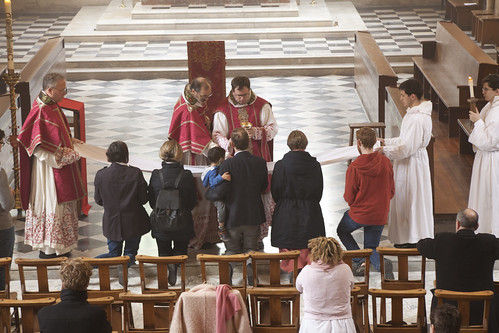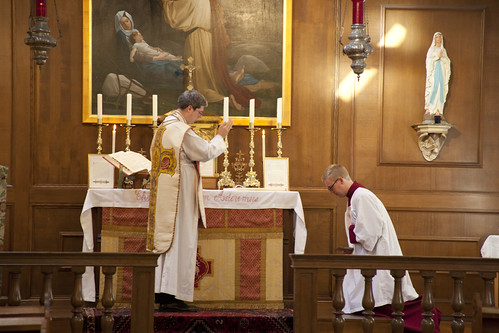 |
| 'Feed my sheep.' |
I thought I'd repost a section of an old, over-long post from this blog on young people and the Traditional Mass: this is below, and the post is here.
One point I'd want to stress here is when young Catholics turn up in University Chaplaincies, on Lourdes Pilgrimages, or at various organised events, the organisers have the chance, often taken, to experiment a bit. It might be charismatic-style liturgies, Taize chant, caring-sharing prayer groups, Exposition and adoration, Bible study, or any of a number of things. Some of these things will appeal to some young people and, if the Blessed Sacrament is not profaned and if the Faith is not denied, well, good for them, though there are sometimes dangers involved as well. My point is that these things are not simply the liturgy and the sacraments: they are something added to the liturgy and the sacraments, because the liturgy and the sacraments are felt to be insufficient. Insuffiently thrilling, perhaps.
When a group of young Catholics is offered something Traditional, say on an LMS Pilgrimage or the St Catherine's Trust Summer School and Retreat, or events organised by one of the Traditional Priestly Institutes, what they get is, centrally, the liturgy and the sacraments. We don't exclude all para-liturgical devotions, obviously, but the high point of what happens is the liturgy and the sacraments. Not for nothing are we the movement for the promotion of the Traditional Mass. It isn't something we've invented or adapted or composed. It is something given to us by the Church. The words of the Mass, and maybe parts of the Office, and of traditional devotions like the Rosary and Benediction, which are on offer at these events are not ours, they are the Church's words. The sacraments of the Eucharist and of Confession have power, not from our cleverness, but from Christ. If the Catholic Church has anything to offer, she offers it through the liturgy and the sacraments. We are not going to go wrong in offering people these things, using the forms and the language used by the Church for many centuries.
Those who would like encourage pastors with the care of young people to offer them every exotic fruit of experimentation, inspiration, or even syncretism, but not the Traditional Mass, I wish they would stop and think about what they are doing. They would say that the Traditional Mass takes people away from the mainstream Church. But why aren't they offering people what the Church offers them?
---------------
Reposted, in part, from Sept 2014.
The question, to repeat, is not what the young people are explicitly asking for, since they don't, usually, know what the options are. The question is what they make of what they are offered. Some will like the evangelically, charismatically, groove, though I do wonder what happens to them when they feel they are getting a bit old for it. This problem isn't limited to the Catholic experience: if Holy Trinity Brompton is full of under-30s, and has been for 30 years, what's happens to them when they reach 30? At least a proportion of them lapse with a life-long inoculation again Christianity, which they regard as juvenile, anti-intellectual, and embarrassing, a phase in their lives they'd rather not talk about.
Do young people respond to the Traditional Mass and traditional devotions? A good number of them do. These are available in such a limited number of places that it is impossible to make a scientific appraisal, but for many young people the experience of the Traditional liturgy is a life-changing revelation. They may grow out of it, a few certainly move on, but what we don't need to worry about is it being a fad fuelled by dubious religious emotion. It appeals to the heart, through the music and ceremonies, it appeals to the intellect, through the texts and the theology, but above all it is all about the public prayer of the Church and the Sacraments.
My experience of talking to the young people who came to our Mass in the Slipper Chapel at Walsingham, a young lady and a man, who said that it was a huge relief after the Youth 2000 experience, mirrors conversations I have had with masses of young people, and their pastors, over the years. To repeat the obvious, very few Catholics under 40 have even heard of the Traditional Mass: it is a completely closed book to them. For many, nevertheless, when they stumble across it, it is exactly what they have been looking for. For others, it answers questions, historical and spiritual, they have been asking for a long time. Others find in it, after a bit of getting used to it, an approach to spirituality which is uniquely satisfying. Such, of course, was my own personal experience as well.
 |
| One of two EF Low Masses celebrated at the Evangelium Conference last time I was there. Each morning. |
I'm glad to say that the Traditional Mass is beginning to creep in as an option in some of the settings where young Catholics are to be found in numbers. You will find it at meetings of the Faith Movement, at the Evangelium Conference, at the forthcoming SPUC conference, and in a growing number of University chaplaincies. It is still a bit marginal, usually, the early morning 'quiet Mass' option, but it is a start. Let's not forget what Pope Benedict XVI said of it:
... it has clearly been demonstrated that young persons too have discovered this liturgical form, felt its attraction and found in it a form of encounter with the Mystery of the Most Holy Eucharist, particularly suited to them.
Support the work of the LMS by becoming an 'Anniversary Supporter'.
I read the document on the Vatican website ... He addressed his talk to "Christians" who are "hypocrites" because they are masking their own imperfections while attacking others, among other things .... He went onto address youth based on the scriptural reference in Acts where Paul was stoning Stephen .... and Paul was young ...... then he generalized claming a good person ..well intentioned ... but needed to be more gentle and that we need to pray for that with our young people
ReplyDeleteI don't see how you translating that to another personal affront of the youth devoted to TLM ?
For the simple reason that liberal accuse conservative and traditional Catholics of 'rigidity' so often, and have done so for such a long time, that it has become established as a code. 'Rigid' seminarians have been thrown out of seminaries, for example, for praying the Rosary or believing in the Ten Commandments, since the 1980s.
DeleteI believe that there was another shot at "rigidity" in this morning's homily at Santa Marta. I've become tired of what seem more like rants than homilies. If a priest in a parish continually held up straw men to criticize and judge the way the Pope does, we'd probably say the issue was his, not his imagined foes. His continued harsh judgement on those he perceives disagree with him is divisive and corrosive. It's a strange moment in the Church, more than strange a sad moment. The Pope is damaging the Church's unity rather than building it up. I've always prayed for "the Holy Father and his intentions." Now I simply pray for "the Holy Father" and for the Church. "The gates of hell will not prevail against it..." But it's the first time in my life that the gates of hell seem so evident.
ReplyDeletePray for us priests that we remain faithful. The words each night at Compline are a great reminder to us not just "resist him" but "solid in the faith".
If we take a conservative estimate and consider the Roman Mass to have been codified by the reign of Pope St. Gregory the Great (ca. 600) and to have lasted intact until 1970, we are talking about close to 1,400 years of the life of the Church—and that’s most of her history of saints. The prayers, readings, and chants that they heard and pondered will be the ones you hear and ponder.I read this when I went to buy college essay
ReplyDelete